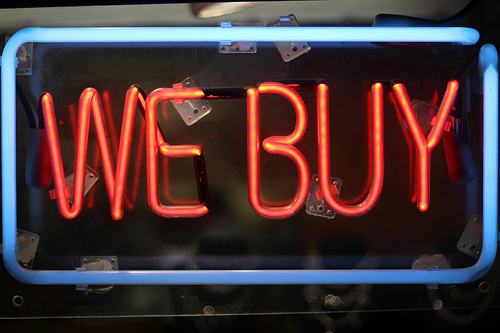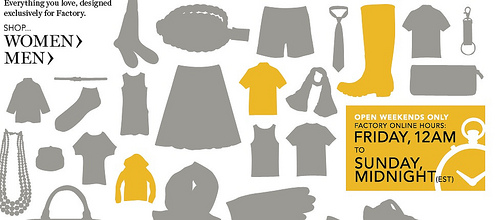

The latest Wired has a great piece by Matt Schwartz on what he terms "retail hacking".
He describes a confluence of forces that have given rise to the emergence of consumers who will devote hours to hacking the system to get deals and how this world has been made accessible to masses of consumers through the efforts of new players like Groupon and Living Social.
Groupon's genius, is to to take the time consuming and previously unattractive world of coupon shopping from the striving fringes of culture and make it mainstream cool. Getting a deal on Groupon is nothing to be ashamed of, instead, it's something you brag about. This is the reason Goggle is so interested in buying Groupon for billions of dollars.
Schwartz describes the emergence of the new deal-driven consumer- "the retail hacker".
"Take a step back, though, and what Groupon represents is something far bigger. It’s the mainstreaming of a new current in American consumerism, an attitude born of the Internet’s DIY ethos and nurtured by the hard economic times. One might call it retail hacking: the reconception of shopping as not just a full-time job but a contact sport, a scrum in which consumers increasingly refuse to buy on the terms dictated to them. A whole network of so-called deal-hunting sites, each with a large and devoted community, has sprung up for users to trade inside tips about little-known bargains; the largest of these sites, SlickDeals, has more than 700,000 registered members.
In this passionate consumer underground, techniques for chiseling a few percentage points (or more) off a sticker price can quickly spread to millions of shoppers. The process of selling a DVD player or even a new razor to the growing ranks of self-educated buyers is becoming as tortuous as selling them a new car. GetHuman.com, a continuously updated list of direct customer service lines and telephone-prompt guides, is undermining the ability of companies to resolve calls with automated systems. Consumers who have learned to haggle on prices at large chain stores—Target, Home Depot, Best Buy, and more—share their stories and methods on sites like the Consumerist, a blog that has become a hub for retail hackers. When Ely Rosenstock, a 29-year-old social media consultant from New York, wanted to cancel his Verizon service and buy the new iPhone, he found a loophole that let him leave his two-year contract with no termination fee; after he made this argument stick with Verizon customer service, he posted a detailed how-to video on YouTube that has been viewed more than 180,000 times."
The article implies that the way we think about selling, about deals and about pricing probably all needs to change. The forces of Web 3.0, "The Crowd", consumer empowerment and frugality are all coming together to create a radically new environment.
This is an environment that's forcing both brands and retailers to think differently about how they sell.
Posted by Ed Cotton
Most online shopping experiences are bland and highly predictable, but I think all this might be about to change and the third revolution might be upon us.
The first was just getting online, the second was all about improving and enhancing the merchandising and the third is going to be all together different.
Finally, retailers might be starting to realize that the huge advantage of having an online presence is flexibility on a scale that's unimaginable within the context of a physical space.
Add to that, the massive opportunities that exist to integrate content and social networking tools and online retail could be looking very different within a year.
One cannot deny that the influence of Gilt and Groupon has been massive and shown these retailers how they need to be much more creative with pricing and concept.
A good example of this in action is J.Crew's Factory store; an online store that's only open at the weekend and sells discounted items.

This has to be one of the first manifestations of the third revolution in online retail.
Posted by Ed Cotton
Flash sales sites seem to have what it takes to get recession weary shoppers to open their wallets and part with their cash. This is all about the "deal" and the genius of the sites is to make it easy for consumers to get access to exclusive products and knock down prices. The model works because of the limited-time nature of these offers and the understanding among shoppers that quantity is limited.
Gilt Group seems like an apt name, given that they are really in the business of making luxury shopping a "guilt-free" experience. There are no bags to be seen with, no hard to find sample sales to locate and the massive discounts on well-respected brands can clearly be identified and seen.
in today's retail environment, promotion is the name of the game and retailers aren't getting traffic into the stores with out it. There has to be a major reason for consumers to go into the store in the first place. They've become highly strategic and are masters of sniffing out great deals.
The power of the flash sale is that is forces consumers to make decisions and to buy. The interesting part, one that's currently under-developed, is the gaming aspect. There's a certain competitiveness that's part of the attraction- people don't want to miss out and there are several ways this might manifest itself.
We are certainly at the early stages of the development of the flash sale category,I expect we will soon see these tactics deployed by a host of retailers with their online stores, in addition to the emergence of a whole of host of new players beyond Gilt Group.
Posted by Ed Cotton
Obviously, they are bored with cost-cutting advice and have moved onto new horizons. With Western economies feeling the pinch, the big consulting groups are turning their attention to the leading lights in the developing world where the emergence of a real middle class is turning them on. Their latest pitch to giant corporations, is to think about these emerging global economies and to devote energy and resources to capturing dollars from this transformation.
This is clearly an opportunity for consultants since they can provide analysis and insight into these markets and perhaps even help to line potential partners to help crack the market. With new markets, there's added complexity and this is where the consultants thrive.
Here's a quote in a piece by McKinsey..
"Multinational companies need new "scale at speed" approaches to penetrate the developing world's increasingly prosperous consumer markets."
Take a look at this chart from AT Kearney showing the opportunity by market for global retail development.
This is just one sign that the axis of the world is spinning away from the Western developed economies and firmly onto the opportunities that exist in these new markets. It's got beyond the point where a simple presence is good enough because the critical mass of middle class consumers are now the right size to market to in a more meaningful way.
Global has become sexy again, but it's for very different reasons and it's going to be a massive opportunity for brands who have the combination of global power and local insight.
Posted by Ed Cotton
The fact that this clearly staged euphoria was manufactured for public consumption, note the presence of TV cameras, is a sign that Microsoft means business. I guess If you can't beat them you have no choice, but to join them.
Clearly, Microsoft understands that Apple is onto something and believes it can succeed if it provides a facsimile experience at retail.
I understand how excitement could be faked at the opening for the media, but finding people who can demonstrate passion, excitement and charisma is not going to be easy.
There's something deeper at work in the Apple store, something than can expressed in store design and that's the thing Microsoft's going to have such a hard job copying.
Posted by Ed Cotton
It might not sound like the most exciting thing ever, but it's great example of a brand opening up and providing utility.
Here are some examples directly from the Best Buy site of how this stuff is being used.
Twitter bot
This is a simple example demo of the
product api, a Twitter bot that will return terse amount of product
data to requesting user as direct message. (ie: "d <user> [msg]")
Using the bot:
1. Sign up for Twitter (skip this step if you already have a Twitter account)
2. Follow bbyremix
3. The bbyremix bot will follow you
4. Issue the find command to bbyremix using the syntax "@bbyremix find 1234567" where 1234567 is the SKU id you're looking for.
Updates:
[11/23/08]: You can now search for music, movies, games and hardgoods. Examples:
- @bbyremix find music U2
- @bbyremix find movie Batman Begins
- @bbyremix find game Farcry 2
- @bbyremix find hard ipod
1. go to www.igoogle.com
2. Log in
3. Click on "Add Stuff>>", on the upper right side of the page
4. Click on "Add Feed or Gadget" on left side bar at bottom
5. Copy this url into the field http://api.remix.bestbuy.com/widgets/lookup_sku.xml
6. Click OK
7. Click OK on popup
8. Click back to igoogle (top left of page)
9. Try it out (it will probably be the iframe on the top left)...plug in a sku like 8842568
Countdown gadget
This widget is a widget that allows users to say that they are waiting for a product to be released. Example: I am dieing to have a Wii so I am going to have a gadget that gives me a count down to when the Wii is going to be available in stores.
Posted by Ed Cotton
